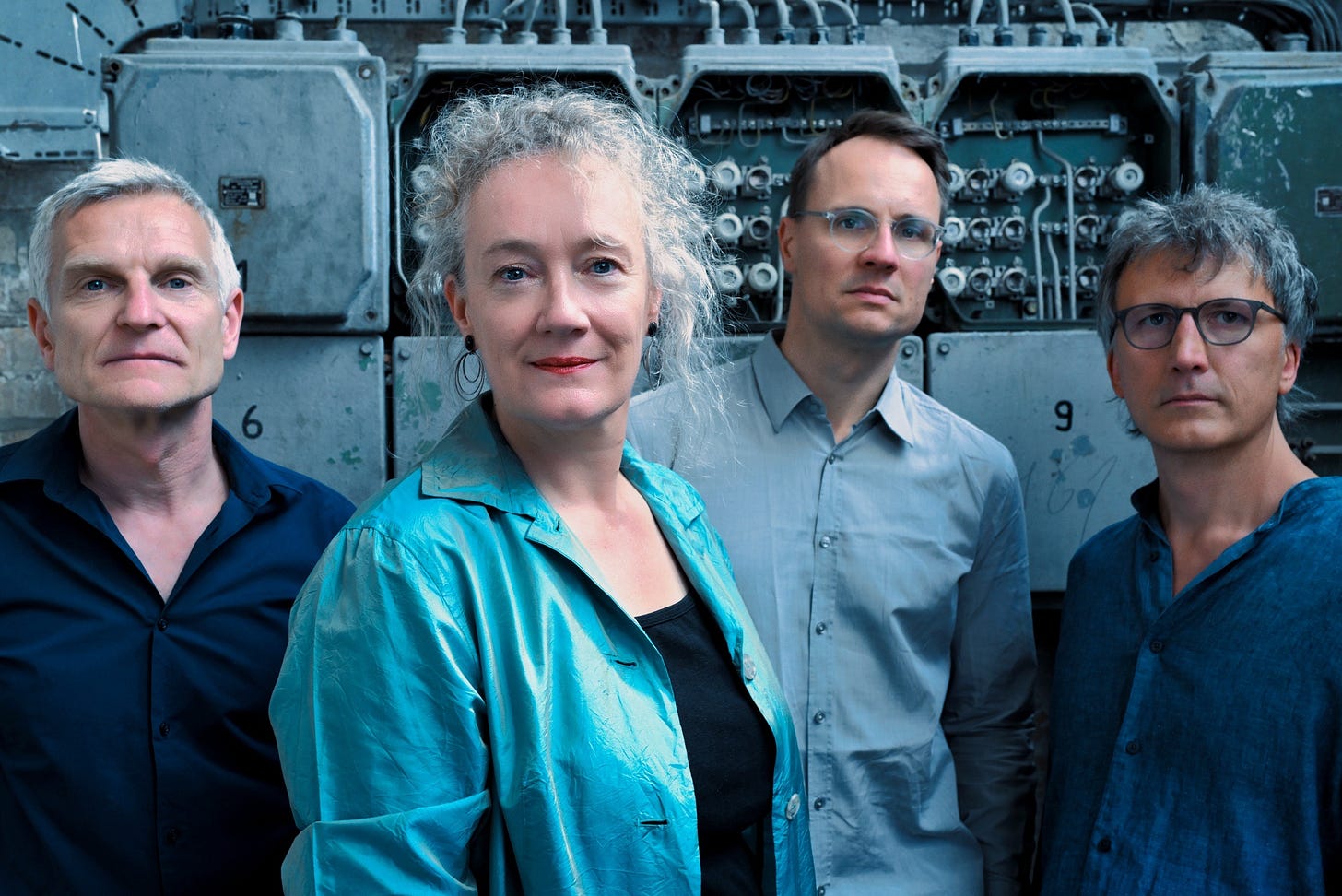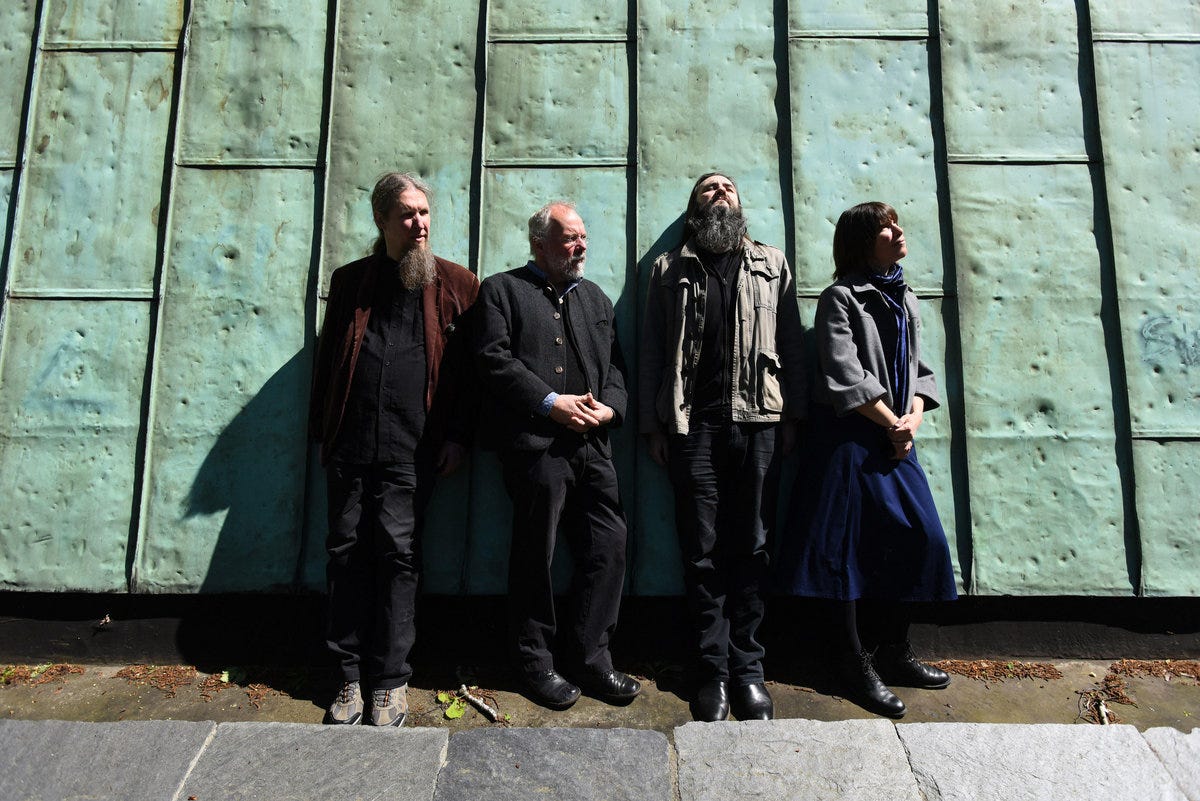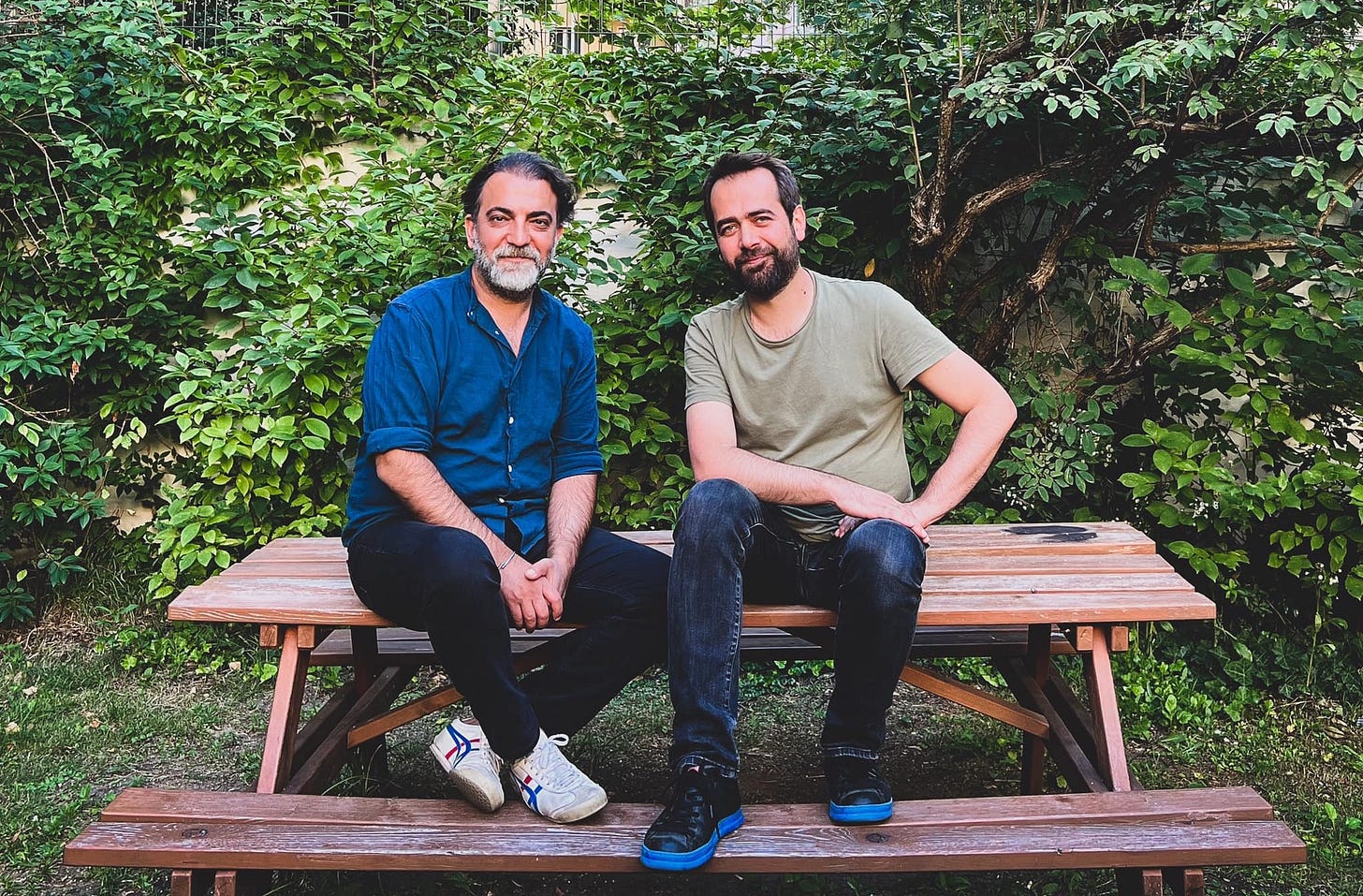Music Flowing From a Spring Thaw
Jülia Hulsmann Quartet, Anıl Eraslan & Taner Akyol, Unzeit Quartett, Jeff Kimmel & Jack Langdon
The Berlin Jazz Mainstream Celebrates Itself
On Wednesday, March 12 the Philharmonie presents a hefty three-group program titled Jazz at Berlin Philharmonic: “Berlin ‒ Berlin” that offers a glimpse of a mainstream segment of the city’s expansive jazz scene, but perhaps its most accurate element is the fact that only one of the bands is comprised of German musicians. I don’t say that as a criticism or a slight. Berlin’s music community is distinguished as much by its international complexion as anything else, and while changes in the city’s affordability and cuts in arts funding threaten its future appeal and feasibility as a home for contemporary culture, it remains a hothouse for curious artists, a nexus of players from different backgrounds with different practices who have the space and time to dig into new projects and collaborations. Speak Low is the long-running trio of Swiss singer Lucia Cadotsch with Swedes Petter Eldh (bass) and Otis Sandsjö (saxophone). Expat American guitarist Kurt Rosenwinkel, who’s lived here for nearly two decades, fronts a drummerless trio with American bassist Doug Weiss and Belgian pianist Nicola Andrioli. Rounding out the bill is the Julia Hülsmann Quartet—the German combo that has been a standard bearer for European jazz for most of the current century.

At the end of January the group released Under the Surface (ECM), with its steady line-up appended on half of the record by Norwegian trumpeter (and goat horn player) Hildegunn Øiseth, who possesses a distinctly Nordic tone a la Nils Petter Molvӕr, albeit with less ambient frostiness. While the band hasn’t demonstrably altered its sonic blueprint, the trumpeter’s presence does change the vibe of the music a bit, thickening harmony, injecting subtle tension, and providing a different improvisational voice. As usual, all members of the band—tenor saxophonist Uli Kempendorff, double bassist Marc Muellbauer, and drummer Heinrich Köbberling—contributed compositions, although Hülsmann wrote the lion’s share of the tunes. The music rides on stealthy, elegant grooves that simmer as much as they swing, supporting typically introspective melodies, finely etched accents, and weightless interplay. On a quintet tune like the drummer’s “May Song,” the influence of the classic Miles Davis Quintet is inescapable from the pin-drop dynamics, the sense of levitation produced Köbberling’s skittery cymbal play, and the cool frontline restraint of Kempendorff and Øiseth patiently articulating the pretty melody. Still, despite those similarities I’ve long wished the group would push the music a bit harder; Hülsmann keeps a tight rein on the group, embracing a cool attack that never spills outside the lines sand rarely accelerates past mid-tempo.Yet within those constraints, the playing is immaculate and sophisticated, its meticulous sense of proportion requiring serious technical rigor and careful listening.
You can hear a cantering energy deep with Muellbauer’s tune “Nevergreen,” with the rhythm section laying down an insistent pulse that’s just steps from exploding into a furious tempo. In this case, though, the refusal to let loose generates a nice heat, affording the trumpeter to let off some steam in her forceful solo, with the pianist bringing in a nice post-bop richness in his own improvisation. Check it out below. The leader’s tune “Anti Fragile” brings some welcome vitality. In press materials Hülsmann admits that she composed the tune “ in a moment when I was quite angry. I wanted to translate that to music, demonstrate the fact that every character has different facets. Music isn’t simply ‘pretty’, but it can be rough, too.” Of course, she’s right, but I wish those feelings extended beyond the 2:40 of that tune. In fact, the album is marked by a deliberate concision, with only three of the ten tracks clocking in at over five minutes—and just barely—but I imagine the band will stretch out during this high profile performance, trusting in its gifts to treat the recording as templates to be stretched, dissected, and maybe even exploded.
Turkish Traditions Refracted Though Berlin’s Improv Scene
Cellist Anıl Eraslan is one of the finest, most versatile improvisers in Berlin, a musician who moves easily between abstraction and post-bop contexts. I first zeroed in on his playing within Antonio Borghini’s excellent sextet Banquet of Consequences, a group that melds the witty, life-affirming aesthetic tendencies of jazz traditions from Italy, the Netherlands, and South Africa inside a single, smile-producing concoction. He’s worked with Borghini on other contexts, too, including the Malacoda String Quartet, which is dedicated to playing the music of fellow cellist Tristan Honsinger—the ensemble debuted at Jazzfest Berlin last fall. Eraslan is Turkish, and he’s invested serious time in documenting and supporting improvised music in his homeland: his documentary film Sound Dreams of Istanbul gets its Turkish premiere at the Istanbul Film Festival next month. Despite his devotion to jazz-oriented improv, he’s never turned his back on the traditional music of Turkey, and this week we get a chance to hear him bring his improvisational ethos to those cadences in a duo project with the baglama player Taner Akyol—another Berlin-based Turkish expat who moved to the city nearly three decades ago, studying with Walter Zimmermann and Helmut Zapf. The duo performs at Bavul Kunst & Kultur Café on Thursday, March 13.
The concert serves as a release party for a bracing 2024 duo recording, Hayalleme (Ada Musik), a fully improvised session where the brittle twang of the baglama can’t help but connect the sounds to Turkish traditional music, but the execution can’t be pinned down to any single practice. Eraslan’s peerless technique and range finds him playing different roles: offering sharp melodic counterpoint, producing richly varied textures, and toggling between swooping arco patterns and knotty pizzicato flurries. The pair’s rapport is dazzling, as each musician routinely anticipates where his partner might take the action next, or one of them prods or challenges the other to take an unexpected route. Below you can listen to “Hayalleme 3,” where the cellist moves through spectral harmonics into lyric flights marked by a penetrating sorrow before engaging in a fleet dialogue with Akyol’s fluid stabs, an elegant, seriously profound and moving sonic dance. Each of the album’s seven improvisation carves out different spaces, such as “Hayalleme 4,” where Akyol deploys some unusual extended techniques, generating wiry tones that feel like some visceral slide guitar effects, slithering across or piercing Eraslan’s striated veil.
The Time is Now for Unzeit Quartett
When a music community is as sprawling, overlapping, and multi-generational as the one here in Berlin it’s not easy to keep tabs on every facet of the landscape. Some groups ascend, achieving a level of notoriety and acclaim that takes them outside of the city’s confines, but more often than not most collaboration occurs solely within it. But such a local thrust doesn’t mean a given project isn’t as good or strong as the ones that gain traction abroad. Take a look at Unzeit Quartett (in English, Untimely Quartet), for example, an initiative of ex-pat French pianist Céline Voccia, a superb improviser who works in various contexts around the city, but who hasn’t attracted the attention she deserves. (As an aside, I just caught a superb duo set by her and alto saxophonist Silke Eberhard last week, when they opened for Craig Taborn and Peter Evans at Institut Francais.) The pianist enlisted double bassist Matthias Bauer, drummer Joe Hertenstein, and saxophonist Frank Paul Schubert—all active, agile and seasoned jazz-rooted figures on the local improv scene—toward the end of 2021, a time when playing opportunities remained scant due to the pandemic. Voccia had no grand plans other than to arrange a get-together for some exploratory playing in a rehearsal space.

The musicians recognized a connection, but it would take another year before they managed to gather in a recording studio—hence the group moniker—to create the seven improvised pieces on its eponymous debut album for Trouble in the East, which dropped late last year. There’s nothing in the music that, in some sense, you haven’t heard before, but that’s not the point. Instead Unzeit Quartett corrals its shared experience and commonalities to forge a powerful collective approach that would nominally be called free jazz. But the musicians don’t hesitate to draw upon swing-oriented ideas, whether it’s the lilting fragments of bebop in Schubert’s buoyant phrasing or the imperturbable pulse within every abstract gesture Hertenstein lays down. The musicians all seem at ease within the given sonic blueprint, pushing and pulling against the dominant flow here and there, but ultimately riding the propulsive yet airy rhythmic drive sculpted by Bauer and Hertenstein as a default. The music breathes naturally, ebbing and flowing, emerging from spare piano chords shaped by Voccia or knotty, woody tones plucked by Bauer, depending on the moment. Anyone can divert or coalesce around within the action. As listenable as the recording is, and as much as I’ve enjoyed spending time with it, Unzeit Quartett is clearly best experienced live. No matter how many memorable moments of serendipity emerge on the recording, the real treat is watching an ensemble achieve such feats in front of our eyes, out of thin air. Astonishgingly, the group performs in Berlin for the very first time on Wednesday, March 12 at the Panda Theater, but until then you can get a sense of the combo’s sound by checking out “Bestzeit,” below.
The Sonic World Beneath the Placid Surfaces of Jeff Kimmel & Jack Langdon
Regular readers of this newsletter have surely detected my predilection for a certain strain of reserved minimalism—music marked by meditative states, long tones, intimacy, and, often, weird tunings or psychoacoustic effects. While I’d long enjoyed such sounds, during the pandemic they became a balm, and along the way they opened up ears like never before, leading to the recognition of unparalleled richness contained in the best of such work. What seemed placid and uneventful on the surface frequently obscured a virtual symphony of harmonic movement, beating, and sonic collisions under the hood. The latest such excursion into this realm that’s flipped my lid has been The other side of the air (Dinzu Artefacts), a duo recording by Chicago keyboardist Jack Langdon and clarinetist Jeff Kimmel. Over four measured improvisations the pair produce slow-moving objects that contain a thrilling host of interactive sounds abounding with overtones and other effects that frequently suggest that the pair is drawing upon electronic sources, particularly on “language ends,” which sounds like softly mewling feedback rather than reeds. But it’s all acoustic, Kimmel carefully unspooling clarinet lines into the dense, yet somehow airy chordal morass that Langdon produces on a portable, hand-built pipe organ. Those harmonic feasts are addictive, pulling me into the sound and allowing my mind to get lost in those cascading, undulating tones. Sounds align, unleashing the infectious sweep of beating patterns, and clear intonation becomes sour with the incursion of the slightest pitch adjustment.
The pieces are improvised, but Langdon and Kimmel are working within parameters they’ve developed together.They don’t sweat imperfections. I love the instability that welcomes each new excursion, as well as the rough patches that occur as the musicians adapt to microtonal shifts. They always re-tune beautifully, but there’s also something deeply compelling and tender about those fleeting seconds before they find each other and lock in. On a piece like “holy departure” you can hear individual organ pitches, as Langdon occasionally eschews long tones for relatively quick single note runs, but at the same time something prevents the two instruments from exhibiting individual clarity: there’s wheezing, muted boiling kettle cries, flurries of slide whistle-like swoops, and what seems like steady, unpitched breaths spilling from the clarinet, but I can’t really be sure of the provenance of anything, despite it all coming from just two instruments. Below you can check out the closing piece, “the most practiced distance” which at first blush might the most static entry on the album, but, of course, once your ears let it all seep in the beating patterns, molasses-slow line shifts, and harmonic clusters disabuse you of any sense of simplicity.
Recommended Shows in Berlin This Week
March 11: Trio Abstrakt (Salim(a) Javaid, saxophone, Marlies Debacker, piano, and Alexandre Silva, percussion) play Haukur Þór Harðarson, Georges Aperghis, and Marco Momi), 8 PM, BKA Theater, Mehringdamm 34, 10961 Berlin
March 12: Jazz at Berlin Philharmonic: “Berlin ‒ Berlin” with Speak Low (Lucia Cadotsch, voice, Petter Eldh, bass, and Otis Sandsjö, tenor saxophone); Julia Hülsmann Quartet (Julia Hülsmann, piano, Uli Kempendorff saxophone, Marc Muellbauer double bass, and Heinrich Köbberling, drums); Kurt Rosenwinkel Trio (Kurt Rosenwinkel, guitar, Doug Weiss, double bass, and Nicola Andrioli, piano), 8 PM, Philharmonie Berlin, chamber music hall, Herbert-von-Karajan-Straße 1, 10785 Berlin
March 12: Unzeit Quartet (Frank Paul Schubert, saxophone, Céline Voccia, piano, Matthias Bauer, double bass, and Joe Hertenstein, drums) 8 PM, Panda Theater, Knaackstraße 97, (i.d. Kulturbrauerei, Gebäude 8) 10435, Berlin
March 13: Taner Akyol, baglama, and Anıl Eraslan, cello, 8 PM, Bavul Kunst & Kultur Cafe, Annenstr. 13, 10179 Berlin
March 13: Milana Zarić, acoustic & electric harp, electronics, Richard Barrett, electronics, 8 PM, Exploratorium, Zossener Strasse 24, 10961, Berlin
March 13: Ohrenschmaus (Lina Allemano, trumpet, Dan Peter Sundland, electric bass, and Michael Griener, drums), 8:30 PM, Sowieso, Weisestraße 24, 12049 Berlin
March 14: Kaluza Meinhold Duo (Anna Kaluza, alto saxophone, and Niko Meinhold, piano), 7:30 PM, Salon L´écritoire, Schönwalder Str. 20, 13347 Berlin
March 14: Krise (Emil Bø, trombone, Anna Ueland, synthesizer, Kristian Enkerud Lien, refretted guitar, lap steel, Bjørn André Syverinsen, drums), 8:30 PM, Donau115, Donaustraße 115, 12043 Berlin
March 15: Tenor Madness #6 (Tony Malaby, Sophie Alour, Philipp Gropper, and Fabian Willmann, tenor saxophones, Eva Kruse, bass, Moritz Baumgärtner, drums), 8:30 PM, Donau115, Donaustraße 115, 12043 Berlin





